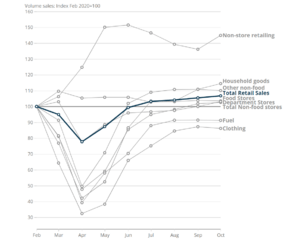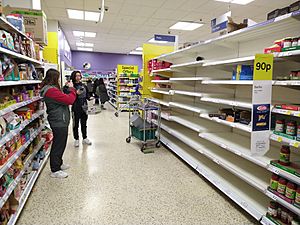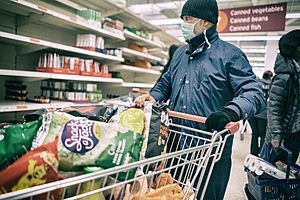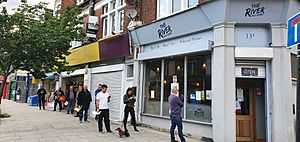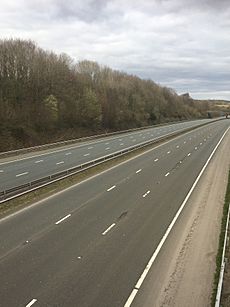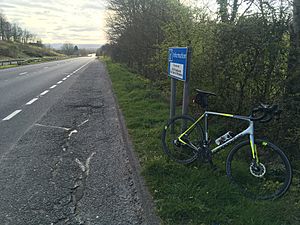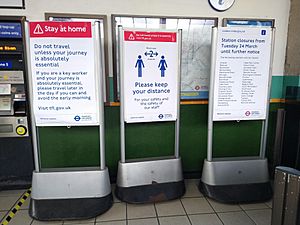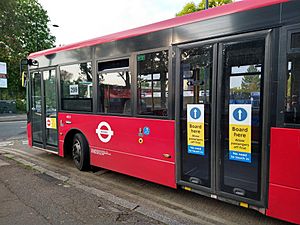Economic impact of the COVID-19 pandemic in the United Kingdom facts for kids
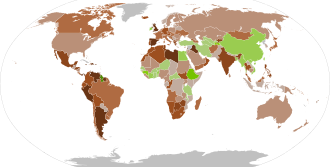
Map showing real GDP growth rates in 2020, as projected by the IMF
|
|
| Date | March 2020 – May 2023 |
|---|---|
| Type | Global recession |
| Cause | COVID-19 pandemic-induced market instability and lockdown |
| Outcome |
|
The COVID-19 pandemic caused big changes to the UK's economy. It affected many things, like how people travel, how much money businesses made, and how many people had jobs. The pandemic also made it harder for some industries to operate.
Contents
How Charities Raised Money
Many charities saw their income drop a lot. They lost about £4 billion because fundraising events were cancelled.
But many people and groups started to raise money to help those affected by the pandemic. For example, 99-year-old Tom Moore raised over £28.2 million. This was the most ever raised by a JustGiving campaign.
The London Marathon, a huge fundraising event, was moved from April to October 2020. In 2019, it raised £66.4 million for charities. To help make up for lost money, a group called Mass Participation Sports Organisers created The 2.6 Challenge.
On April 18, several UK artists performed from their homes in a live music event called Together at Home. This event helped raise money for the World Health Organization's COVID-19 Solidarity Response Fund.
Later, Children in Need and Comic Relief worked together for the first time. They put on a TV show called The Big Night In on April 23. It raised £27.4 million in just three hours. The UK Government promised to match this amount.
The UK government also announced a £750 million support package for charities. Most of this money went to smaller, local charities helping vulnerable people.
Shopping for Clothes
The clothing retail industry faced challenges. For example, Edinburgh Woollen Mill (EWM), which owns brands like Peacocks, said it might have to change its business or sell parts of the company. This group employs 24,000 people.
Building and Property
Many construction sites stayed open at first, even with new social distancing rules. But then, many big construction companies like Mace stopped work on March 24. There was some confusion about which jobs were essential.
In Scotland, all non-essential building work had to stop from April 6. Many construction companies had to put hundreds of their workers on furlough. This meant the government paid a part of their wages.
By April 17, work had stopped on 2,434 building sites in the UK. This was about 35% of all construction work. Later, it was estimated that 43% of sites closed during the first six weeks of the pandemic.
The slowdown in building also affected companies that supply materials. Some reported big drops in sales. In May, a report said that construction was one of the three most affected parts of the economy. It was losing about £300 million every day.
By August, building work started up again faster than expected. But the Construction Products Association still thought that overall building output would drop by 20.6% in 2020.
Building and Selling Homes
Housebuilders like Barratt and Taylor Wimpey also stopped work on March 24. By April 8, about 80% of UK home-building sites had closed.
In May, it was thought that home-building activity had dropped by 85% during the lockdown. Housebuilders then planned to reopen sites safely in late April and early May.
A study in April predicted that home sales would drop by 38%. This would mean over half a million fewer sales. It would also reduce government income from taxes like stamp duty. In May, Nationwide reported that house prices fell by 1.7% from the month before. This was the biggest monthly fall in 11 years.
Food Shopping
In early March, people started to buy a lot of food and other items, like hand sanitiser. This is called panic buying. Supermarkets and their suppliers made plans to make sure there was enough food. Online shops saw very large orders.
Some shops started to limit how many popular items each customer could buy. Sainsbury's set aside special shopping hours for older and disabled customers. They also gave them priority for online deliveries. Other supermarkets like Iceland and Morrisons did similar things. Morrisons even offered special food boxes to feed two adults for a week.
On March 21, Professor Stephen Powis from NHS England asked people to shop responsibly. He said that NHS staff were struggling to find food because of panic buying. The head of the British Retail Consortium said there was enough food. She added that people had spent an extra £1 billion on food in the previous three weeks.
Money and the Economy
The head of the Bank of England asked the government to help businesses. They wanted to prevent the UK economy from falling into a recession. Companies on the London stock market lost value because of worries about the virus.
To help the economy, the Bank of England cut its interest rate twice. It went from 0.75% down to 0.10%. This was the lowest rate in the bank's 325-year history.
On March 28, a company called Fitch Ratings lowered the UK's credit rating. This was because the government was borrowing a lot of money due to the virus. The Bank of England predicted on May 7 that the UK would face its worst recession in over 300 years. But they also thought the economy would get better in 2021.
In March, 1 million British workers applied for the Universal Credit benefit. By April, the number of people claiming unemployment benefits rose to 2.1 million.
A study found that 30% of workers with the lowest incomes were affected by the pandemic. This was compared to only 10% of those with the highest incomes. About a quarter of young people (18 to 24-year-olds) were furloughed, and 9% lost their jobs.
In early April, it was predicted that unemployment could rise to 3.4 million. It was also thought that the UK's gross domestic product (GDP) could fall by 35%. By June, unemployment did reach over 3 million. The GDP fell by 20%, which was the biggest drop since records began in 1955.
In November 2020, the government announced that the UK would face its worst economic slump in 300 years. The economy was expected to shrink by 11.3% in 2020.
Restaurants, Pubs, and Hotels
On March 16, Prime Minister Boris Johnson asked people to avoid social places like pubs and restaurants. Then, on March 20, he asked them to close completely.
A survey in May 2020 showed that 83% of workers in hotels and food services were furloughed. This was the highest percentage of any sector.
Some fast food places started to reopen for takeaway in late May. Pubs, hotels, and restaurants were allowed to fully reopen on July 4.
Tourism across the UK dropped a lot because of travel rules and lockdowns. This meant fewer visitors and many job losses.
Fast Food
Fast food chains like Pret a Manger and McDonald's first said customers could only take food away. Then, on March 22, McDonald's announced it would close all its UK and Ireland restaurants. Nando's also closed its outlets.
Some chains reopened for takeaway and drive-through in late May. By early July, Pret a Manger had reopened most of its shops. But it planned to close 30 outlets and cut at least 1,000 jobs.
Pubs
At first, the pub chain J D Wetherspoon tried to stay open with social distancing. But from March 20, all Wetherspoon pubs closed. On March 25, shops selling alcohol to take away were allowed to stay open. This meant pubs with the right licences could sell beer for home use.
Hotels
Hotels were hit very hard. The head of InterContinental Hotels Group (IHG) said it was the industry's "most significant challenge" ever. Some hotels were used to house NHS patients, key workers, or homeless people.
Restaurants
Many restaurant groups faced big problems. On May 18, Casual Dining Group (CDG), which owns Bella Italia and Café Rouge, said it might have to go into administration. This could put 6,000 jobs at risk.
By May 22, it was thought that over 30,000 UK pubs and restaurants might close for good. On July 2, CDG went into administration, closing 91 restaurants and losing 1,900 jobs. Other chains like Zizzi and ASK Italian also closed many restaurants and cut jobs.
Travel and Transport
After lockdown started in late March, UK road traffic dropped to levels not seen since the 1950s. This also led to less air and noise pollution. By May, traffic slowly increased but was still much lower than usual.
In April 2020, petrol prices fell below £1 per litre at some places. This was the first time since February 2016.
Air Travel
From January, Heathrow Airport increased health checks for flights from Wuhan. Later, airlines like British Airways and Ryanair cancelled many flights.
Regional airline Flybe, which was already struggling, stopped operating. British Airways' parent company announced it might cut 12,000 jobs. EasyJet also laid off 4,000 cabin crew for two months. Virgin Atlantic cut 3,000 jobs and left Gatwick Airport.
London City Airport closed temporarily on March 25. Heathrow and Gatwick airports also reduced their operations. Most other UK airports scaled back and paused expansion plans.
In May, a 14-day quarantine was announced for anyone arriving in the UK from outside the UK or Ireland. This rule was criticized by airlines. On July 3, the government released a list of countries from which arrivals would not need to quarantine.
Public Transport
On March 20, the government announced emergency help for the UK's rail network. Train companies were nationalized for at least six months to stop them from failing. Many train services were reduced.
Transport for London (TfL) services were also reduced. All Night Tube and Night Overground services stopped. Many tube stations closed. The Mayor of London asked people to use public transport only if it was absolutely necessary.
In April, TfL told bus passengers to use middle or rear doors to protect drivers. This was after 14 TfL workers, including nine drivers, died.
Because fewer people were using public transport, TfL lost a lot of money. On May 7, TfL asked for £2 billion in government help. On May 14, the UK Government agreed to give TfL £1.6 billion in emergency funding.
On May 8, Transport Secretary Grant Shapps said that even with all public transport running, social distancing rules meant the network would only be at 10% of its normal capacity. He also noted an increase in walking and cycling.
From June 15, passengers and staff on public transport in England had to wear face coverings. Anyone who did not could be refused travel or fined.
Betting Shops
William Hill, a company with many betting shops, reported that its profits in the first half of 2020 dropped by 85%. It planned to close over a hundred shops permanently.
See also
 | Sharif Bey |
 | Hale Woodruff |
 | Richmond Barthé |
 | Purvis Young |


